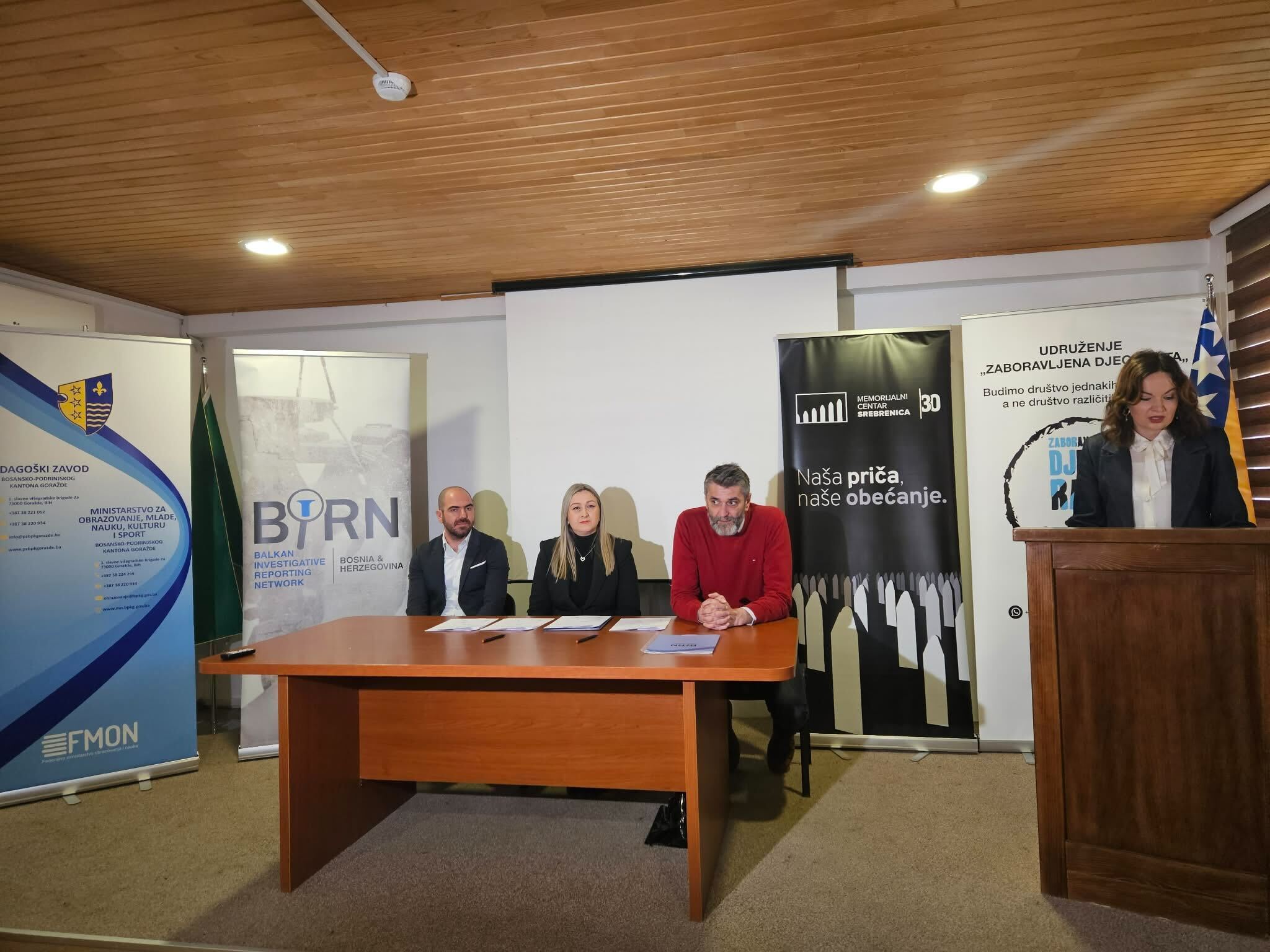This post is also available in: Bosnian
Sitting in a cramped office above a small petrol station run by his son in the town of Pale, above Sarajevo, 70-year-old Krajisnik told BIRN that during the nine years he spent in the courtrooms of the Hague Tribunal, he survived three trials.
He described the first as “the theatre show in the courtroom”; the second was the public perception of people in his own country about his guilt, and the third was his own conscience.
In his first trial, he was found guilty in 2009 of taking part in the persecution and deportations of non-Serb civilians from ten Bosnian municipalities – a charge he continues to deny.
“What was I guilty of?” Krajisnik asked, before going on to reply to his own question: “I was found guilty because the Hague Tribunal concluded that Republika Srpska was created through ethnic cleansing.”
“According to them, the core leadership of the Bosnian Serbs was guilty of this – Radovan Karadzic, Ratko Mladic, myself and others. In essence, if one of us was guilty of something, we all were, so I was convicted of crimes I knew nothing of,” he insisted..jpg)
Despite his conviction, Krajisnik claimed that his conscience was clear and he is happy because he triumphed in the two other ‘trials’.
“Anyone can check my verdict. During the trial, not a single Muslim or Croat testified against me. No one said that Krajisnik did something , nor is there a document that I gave a bad statement. Our people know who is to blame. In Sarajevo, we always knew who was good and bad. My conscience is clear. I asked myself a hundred times if I could have done anything differently and didn’t find that I could have,” he said.
He swears that throughout the three-and-a-half years of war from 1992 to 1995, he never once received information about crimes by Bosnian Serb forces, but only heard speculation.
“Whenever we had any information, we gave orders to the police and army to investigate, but everything was a conspiracy . I only got information about crimes against Serbs, while it was as if Serbs never killed anyone,” he said.
“Volunteers committed a lot of crimes. They were only good for killing and looting. We wanted the security officers to look into that, but I guess they supported the crimes,” he added.
Struggling to clear his name
Krajisnik gives two examples of crimes he was indicted for, but knew nothing about – the killings of more than 100 Bosniaks from Prijedor at Koricani Cliffs on Mount Vlasic in central Bosnia and the forcible removal of a group of prisoners from the Manjaca detention camp near Banja Luka.
He explains that he knew nothing about the violence at Koricani Cliffs, because in August 1992, when the Bosniaks were killed, he was in Belgrade with his wife, who had been injured in a mortar attack and subsequently died. He claims he only learned about Koricani Cliffs after his arrival in The Hague, when he saw that Karadzic asked for an investigation into the crime.
“It was strange that everyone knew and I did not, but that’s only because I was in Belgrade,” he said.
He also said that after his trial he found documents showing that Bosniaks who were ordered to go to western Europe from the Manjaca camp in 1992 were not forcibly removed, but “interviewed and collected by the International Red Cross”.
“I have decided to spend the rest of my life in search of evidence that I am not guilty and that what I was convicted of was not true. My conscience is clear, but I am not happy. Why?” he asked.”
“True punishment is not years in prison, that is a punishment of sorts, but the real punishment is the tag of being a war criminal,” he said.
Krajisnik claimed that he has no need to justify his actions, but said that with hindsight, he should have checked the information he received during the war more thoroughly – “but at the time I figured there were people in charge of that”.
He also says that the municipalities of Republika Srpska were “like little states during the war” and could not be fully controlled by the Bosnian Serb authorities.
“A lot of people during this war ran their own personal wars and carried guns. People did what they wanted and such fools could kill whoever they wanted since there was no order,” he says.
As well as denying that he took part in any crimes, Krajisnik is eager to insist that there were no plans by the Serb leadership to commit crimes either. He claims that a notorious speech given by Bosnian Serb President Radovan Karadzic in 1991, in which he warned Bosniak leaders that their actions could “maybe take the Muslim people into extinction”, was not a threat of violence.
“I can see this speech seems ugly to Muslims, but before Karadzic gave his speech, the Muslim academic Muhamed Filipovic asked for Muslims to make an agreement with their neighbour lest they disappear. Then Karadzic used the same word,” Krajisnik explains.
He also claims that the six ‘strategic goals’ of the Bosnian Serb people which were adopted by the Republika Srpska parliament in May 1992 – one of which was separation from Bosniaks and Croats – were not calls for ethnic cleansing, but just a version of a peace plan from earlier in 1992 which was put forward by Britain’s Lord Carrington and Portuguese diplomat Jose Cutileiro but rejected by the Bosniak leadership on the grounds that it would have divided the country.
Srebrenica – a ‘major crime’
Krajisnik admitted that the killings of thousands of Bosniak men and boys from Srebrenica in July 1995 was a major crime, but denied it was genocide, as it has been classified by both domestic and international courts.
“I would like to see these international norms about what constitutes genocide. I can say easily as a Serb it is not genocide for me, but I am trying to be objective,” he said.
“I am glad in this unhappiness, women and children weren’t killed, but I am mortified that people were lined up and shot,” he added – although he suggested that for him, genocide would have to be a much bigger crime then the killing of 7,000 people.
He was never indicted for genocide in Srebrenica and claimed that he only heard about the huge scale of the crime from media reports.
“I wanted to find out, and in The Hague I spent time with Ljubisa Beara, who was sentenced to life in prison for Srebrenica and I talked to him. He swore it wasn’t like that. So I didn’t find out what happened and I don’t think the Hague Tribunal did either… Some dishonest people lied and said they saw some things and the court made a collection,” he said.
Krajisnik said he doesn’t have a high opinion in general about the war crimes prosecutions at the International Criminal Tribunal for the Former Yugoslavia in The Hague.
He said that when he was arrested and taken there in 2000, he was shocked, since he was cleared to run as a candidate for the Bosnian presidency in 1996 after being probed for potential wartime wrongdoing by international forces and the country’s government.
“An invisible hand declared me responsible because some people they wanted to put in jail were unavailable,” he alleged, alluding to the fact that Radovan Karadzic and Ratko Mladic were, at that point, still on the run after being indicted for war crimes.
Krajisnik said that Karadzic is his friend and that he knows he is innocent, but that he could not vouch for Mladic.
“I know Radovan didn’t want a war and wanted compromise, but I wasn’t around Mladic a lot . I wasn’t in the Main Headquarters in Crna Rijeka and I would be unfair if I said he is innocent, but I cannot say he is guilty. What I can say is that when we had joint meetings he was never in favor of crimes,” Krajisnik said.
He does however believe that the war crimes trials should now stop.
“This insistence on war crimes does not allow for reconciliation. We have a constant heating-up of relations, people wondering how many people have been sentenced on each side. Serbs say they are the only ones put on trial and they want the scales to even out, but I ask, what for? We have to deal with the future, not the past, and give hope to young people,” he said.
Who won the war?
Krajisnik was a negotiator for the Bosnian Serb side at the Dayton peace talks which brought an end to the Bosnian war in 1995; late American diplomat Richard Holbrooke wrote in his memoirs that he was one of the toughest negotiators at the table.
According to Krajisnik, the biggest issue at the Dayton talks was control over the capital Sarajevo.
“The Muslims were the biggest winners at Dayton since they got Sarajevo, which is worth 30 or 40 per cent of the entire country. I know they think the Serbs are the winners”, said Krajisnik.
Looking to the future, Krajisnik said that he fears that Bosnia and Herzegovina might break up one day because of its unresolved ethnic differences and deeply flawed political system in which Western countries often feel they have to intervene to ensure progress and reform.
“This is not working, it is not functional. Foreigners should step aside and let representatives of all three peoples to agree among themselves. Whatever we decide for ourselves, so long as there is no war,” he said.
The way to a better future, he suggested, is forgiveness.
“I decided by myself not to hate anyone,” he explained.
“Muslims killed my daughter-in-law and uncle, and my wife died. I lost my home – my city, Sarajevo – but I will not hate. Not because I love someone, but because it is too difficult to live in hatred. We must forgive, stop apologising, and just forgive,” he said.



